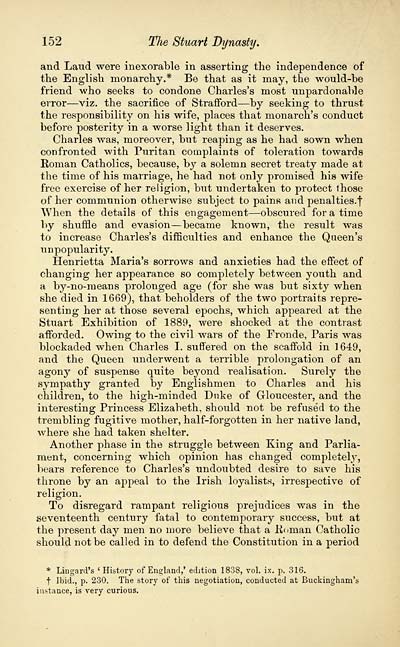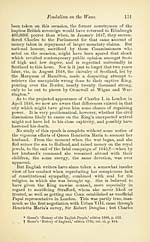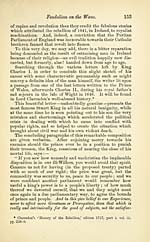Stuart dynasty
(172) Page 152
Download files
Complete book:
Individual page:
Thumbnail gallery: Grid view | List view

152 The Stuart Dynasty.
and Laud were inexorable in asserting the independence of
the English monarchy.* Be that as it may, the would-be
friend who seeks to condone Charles's most unpardonable
error — viz. the sacrifice of Strafford — by seeking to thrust
the responsibility on his wife, places that monarch's conduct
before posterity in a worse light than it deserves.
Charles was, moreover, but reaping as he had sown when
confronted with Puritan complaints of toleration towards
Roman Catholics, because, by a solemn secret treaty made at
the time of his marriage, he had not only promised his wife
free exercise of her religion, but undertaken to protect those
of her communion otherwise subject to pains and penalties. f
When the details of this engagement — obscured for a time
by shuffle and evasion — became known, the result was
to increase Charles's difficulties and enhance the Queen's
unpopularity.
Henrietta Maria's sorrows and anxieties had the effect of
changing her appearance so completely between youth and
a by-no-means prolonged age (for she was but sixty when
she died in 1669), that beholders of the two portraits repre-
senting her at those several epochs, which appeared at the
Stuart Exhibition of 1889, were shocked at the contrast
afforded. Owing to the civil wars of the Fronde, Paris was
blockaded when Charles I. suffered on the scaffold in ] 649,
and the Queen underwent a terrible prolongation of an
agony of suspense quite beyond realisation. Surely the
sympathy granted by Englishmen to Charles and his
children, to the high-minded Dnke of Gloucester, and the
interesting Princess Elizabeth, should not be refused to the
trembling fugitive mother, half-forgotten in her native land,
where she had taken shelter.
Another phase in the struggle between King and Parlia-
ment, concerning which opinion has changed completely,
bears reference to Charles's undoubted desire to save his
throne by an appeal to the Irish loyalists, irrespective of
religion.
To disregard rampant religious prejudices was in the
seventeenth century fatal to contemporary success, but at
the present day men no more believe that a Roman Catholic
should not be called in to defend the Constitution in a period
* Lingard's 'History of England,' edition 1838, vol. ix. p. 316.
f Ibid., p. 230. The story of this negotiation, conducted at Buckingham's
instance, is very curious.
and Laud were inexorable in asserting the independence of
the English monarchy.* Be that as it may, the would-be
friend who seeks to condone Charles's most unpardonable
error — viz. the sacrifice of Strafford — by seeking to thrust
the responsibility on his wife, places that monarch's conduct
before posterity in a worse light than it deserves.
Charles was, moreover, but reaping as he had sown when
confronted with Puritan complaints of toleration towards
Roman Catholics, because, by a solemn secret treaty made at
the time of his marriage, he had not only promised his wife
free exercise of her religion, but undertaken to protect those
of her communion otherwise subject to pains and penalties. f
When the details of this engagement — obscured for a time
by shuffle and evasion — became known, the result was
to increase Charles's difficulties and enhance the Queen's
unpopularity.
Henrietta Maria's sorrows and anxieties had the effect of
changing her appearance so completely between youth and
a by-no-means prolonged age (for she was but sixty when
she died in 1669), that beholders of the two portraits repre-
senting her at those several epochs, which appeared at the
Stuart Exhibition of 1889, were shocked at the contrast
afforded. Owing to the civil wars of the Fronde, Paris was
blockaded when Charles I. suffered on the scaffold in ] 649,
and the Queen underwent a terrible prolongation of an
agony of suspense quite beyond realisation. Surely the
sympathy granted by Englishmen to Charles and his
children, to the high-minded Dnke of Gloucester, and the
interesting Princess Elizabeth, should not be refused to the
trembling fugitive mother, half-forgotten in her native land,
where she had taken shelter.
Another phase in the struggle between King and Parlia-
ment, concerning which opinion has changed completely,
bears reference to Charles's undoubted desire to save his
throne by an appeal to the Irish loyalists, irrespective of
religion.
To disregard rampant religious prejudices was in the
seventeenth century fatal to contemporary success, but at
the present day men no more believe that a Roman Catholic
should not be called in to defend the Constitution in a period
* Lingard's 'History of England,' edition 1838, vol. ix. p. 316.
f Ibid., p. 230. The story of this negotiation, conducted at Buckingham's
instance, is very curious.
Set display mode to:
![]() Universal Viewer |
Universal Viewer | ![]() Mirador |
Large image | Transcription
Mirador |
Large image | Transcription
Images and transcriptions on this page, including medium image downloads, may be used under the Creative Commons Attribution 4.0 International Licence unless otherwise stated. ![]()
| Histories of Scottish families > Stuart dynasty > (172) Page 152 |
|---|
| Permanent URL | https://digital.nls.uk/94819830 |
|---|
| Description | A selection of almost 400 printed items relating to the history of Scottish families, mostly dating from the 19th and early 20th centuries. Includes memoirs, genealogies and clan histories, with a few produced by emigrant families. The earliest family history goes back to AD 916. |
|---|

